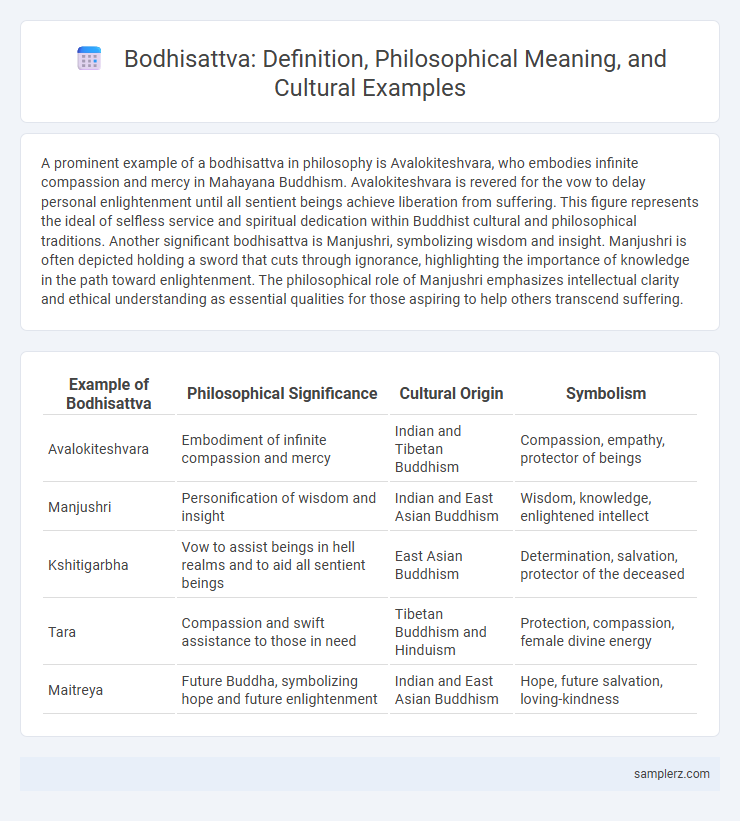A prominent example of a bodhisattva in philosophy is Avalokiteshvara, who embodies infinite compassion and mercy in Mahayana Buddhism. Avalokiteshvara is revered for the vow to delay personal enlightenment until all sentient beings achieve liberation from suffering. This figure represents the ideal of selfless service and spiritual dedication within Buddhist cultural and philosophical traditions. Another significant bodhisattva is Manjushri, symbolizing wisdom and insight. Manjushri is often depicted holding a sword that cuts through ignorance, highlighting the importance of knowledge in the path toward enlightenment. The philosophical role of Manjushri emphasizes intellectual clarity and ethical understanding as essential qualities for those aspiring to help others transcend suffering.
Table of Comparison
| Example of Bodhisattva | Philosophical Significance | Cultural Origin | Symbolism |
|---|---|---|---|
| Avalokiteshvara | Embodiment of infinite compassion and mercy | Indian and Tibetan Buddhism | Compassion, empathy, protector of beings |
| Manjushri | Personification of wisdom and insight | Indian and East Asian Buddhism | Wisdom, knowledge, enlightened intellect |
| Kshitigarbha | Vow to assist beings in hell realms and to aid all sentient beings | East Asian Buddhism | Determination, salvation, protector of the deceased |
| Tara | Compassion and swift assistance to those in need | Tibetan Buddhism and Hinduism | Protection, compassion, female divine energy |
| Maitreya | Future Buddha, symbolizing hope and future enlightenment | Indian and East Asian Buddhism | Hope, future salvation, loving-kindness |
Defining the Bodhisattva Ideal in Philosophical Context
The Bodhisattva ideal in philosophical context embodies altruism and enlightened compassion, exemplified by figures like Avalokiteshvara, who delay personal nirvana to aid all sentient beings. This concept anchors Mahayana Buddhism's ethical framework, emphasizing selfless service and the cultivation of wisdom and compassion as pathways to enlightenment. Philosophically, the Bodhisattva represents the integration of metaphysical understanding with moral action, highlighting interdependence and universal responsibility.
Historical Origins of the Bodhisattva Concept
The Bodhisattva concept originated in early Mahayana Buddhism, emphasizing a being who seeks enlightenment not only for themselves but for the liberation of all sentient beings. Historical texts like the Lotus Sutra and the Avatamsaka Sutra elaborate on the qualities and vows of Bodhisattvas, highlighting compassion and altruism as central virtues. Early Bodhisattvas such as Avalokiteshvara and Manjushri embody this ideal, shaping philosophical interpretations of selflessness and spiritual commitment in Buddhist culture.
Manifestations of Bodhisattva Principles in Eastern Philosophy
The concept of the bodhisattva in Eastern philosophy exemplifies the embodiment of compassion and selfless service, as seen in figures like Avalokiteshvara, who symbolizes infinite mercy and the vow to alleviate suffering. Manifestations of bodhisattva principles emphasize altruistic wisdom and the pursuit of enlightenment not only for oneself but for all sentient beings, influencing ethical frameworks across Mahayana Buddhism. This paradigm fosters a culture of empathy, moral responsibility, and spiritual interconnectedness, deeply impacting Asian philosophical thought and practice.
Modern Philosophers’ Interpretations of Bodhisattva Ethics
Modern philosophers interpret bodhisattva ethics as a framework emphasizing altruistic compassion and social responsibility, highlighting figures like Thich Nhat Hanh who integrate traditional Mahayana principles with contemporary social activism. They analyze the bodhisattva vow as a lifelong commitment to alleviating suffering and promoting interdependence, influencing ethical theories that prioritize empathy and collective well-being. This perspective reshapes global ethical discourse by blending spiritual cultivation with modern human rights and environmental concerns.
Comparative Analysis: Bodhisattva and Western Altruism
The concept of the Bodhisattva in Mahayana Buddhism, exemplified by figures such as Avalokiteshvara, emphasizes compassion and selfless service aimed at liberating all beings from suffering. In Western philosophy, altruism often centers on ethical theories like utilitarianism, where actions are judged by their outcomes in maximizing overall happiness. Comparative analysis reveals that while both emphasize benevolence, the Bodhisattva path integrates spiritual awakening with altruistic action, contrasting with Western altruism's more secular, outcome-focused framework.
Real-Life Figures Embodying the Bodhisattva Ideal
Thich Nhat Hanh exemplifies the bodhisattva ideal through his lifelong commitment to peace, mindfulness, and compassionate activism, influencing global Buddhist practice. The Dalai Lama embodies the bodhisattva qualities by advocating for nonviolence, human rights, and interfaith dialogue while promoting Tibetan culture. Aung San Suu Kyi, despite controversies, has been recognized for her dedication to democracy and nonviolent resistance, reflecting key aspects of bodhisattva philosophy in political leadership.
Application of Bodhisattva Ethics in Social Philosophy
Bodhisattva ethics, emphasizing compassion and selfless service, inform social philosophy by advocating for the alleviation of suffering beyond individual boundaries. This principle encourages policies and community actions that prioritize collective well-being and social justice, reflecting the bodhisattva's commitment to universal empathy. The integration of these ethics fosters inclusive societies where moral responsibility extends to all sentient beings, promoting harmony and ethical governance.
The Bodhisattva Path in Contemporary Moral Philosophy
The Bodhisattva Path exemplifies selflessness and compassion, guiding individuals to prioritize the welfare of others in contemporary moral philosophy. Rooted in Mahayana Buddhism, this path emphasizes the cultivation of wisdom and ethical conduct to alleviate suffering universally. Modern interpretations apply these principles to global ethics, promoting social justice and collective well-being.
Critiques and Debates on the Bodhisattva Doctrine
The Bodhisattva doctrine, central to Mahayana Buddhism, faces critiques concerning its practicality and ethical implications, with some scholars arguing it promotes self-sacrifice to an extreme degree that may hinder personal liberation. Debates often address the tension between altruism and individual enlightenment, questioning whether the ideal of postponing nirvana for the sake of others is attainable or philosophically consistent. Critics also challenge the doctrinal emphasis on universal compassion, suggesting it can lead to idealism detached from socio-political realities, sparking ongoing discourse in Buddhist philosophy and cultural studies.
Bodhisattva Philosophy and Global Cultural Influence
Bodhisattva philosophy, rooted in Mahayana Buddhism, emphasizes compassion and the vow to attain enlightenment for the benefit of all sentient beings. The Bodhisattva ideal, exemplified by figures such as Avalokiteshvara and Ksitigarbha, has profoundly influenced global cultures by inspiring artistic expression, ethical frameworks, and spiritual practices across Asia and beyond. This philosophy promotes altruism and interconnectedness, shaping contemporary discussions on morality, social responsibility, and intercultural dialogue worldwide.

example of bodhisattva in philosophy Infographic
 samplerz.com
samplerz.com